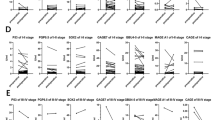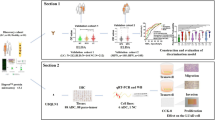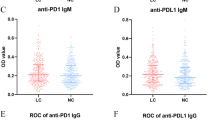Abstract
The aim of this study was to explore the potential value of autoantibody to epidermal growth factor receptor (EGFR) in the diagnosis of lung cancer (LC) and its relation with EGFR mutations. Enzyme-linked immunosorbent assay (ELISA) was performed to detect the level of autoantibody to EGFR in sera from 254 LC patients and 222 normal controls (NCs). Besides, the mRNA and protein levels of EGFR were investigated in Gene Expression Profiling Interactive Analysis (GEPIA) and Human Protein Atlas (HPA) database, respectively. The level of autoantibody to EGFR (anti-EGFR) in LC even different types of LC was obviously higher than that in NC (P < 0.05). The area under the curve (AUC) of anti-EGFR was 0.695 (95% CI 0.645–0.742) when comparing LC patients with NC, while the AUC of carcinoembryonic antigen (CEA) was 0.681 (95% CI 0.629–0.730). Moreover, by integrating anti-EGFR with CEA to diagnose LC, the AUC was up to 0.784 (95% CI 0.737–0.826). However, the expression level of autoantibody to EGFR had no difference between LC patients with and without EGFR gene mutation (P > 0.05). EGFR mRNA expression level was obviously upregulated in squamous cell carcinoma (SCC) tissues compared with normal tissues (P < 0.05), but not in adenocarcinoma (ADC) (P > 0.05). The study confirmed that anti-EGFR could be a potential biomarker for LC diagnosis; additionally, it could improve the diagnostic value of CEA in clinical work.


Similar content being viewed by others
References
Siegel RL, Miller KD, Jemal A. Cancer statistics, 2019. CA Cancer J Clin. 2019;69(1):7–34. https://doi.org/10.3322/caac.21551.
Chu GCW, Lazare K, Sullivan F. Serum and blood based biomarkers for lung cancer screening: a systematic review. BMC Cancer. 2018;18(1):181. https://doi.org/10.1186/s12885-018-4024-3.
Torre LA, Siegel RL, Jemal A. Lung cancer statistics. Adv Exp Med Biol. 2016;893:1–19. https://doi.org/10.1007/978-3-319-24223-1_1.
Hofman P. Liquid biopsy for early detection of lung cancer. Curr Opin Oncol. 2017;29(1):73–8. https://doi.org/10.1097/CCO.0000000000000343.
Dai L, Li J, Tsay JJ, Yie TA, Munger JS, Pass H, et al. Identification of autoantibodies to ECH1 and HNRNPA2B1 as potential biomarkers in the early detection of lung cancer. Oncoimmunology. 2017;6(5):e1310359. https://doi.org/10.1080/2162402X.2017.1310359.
Macdonald IK, Parsy-Kowalska CB, Chapman CJ. Autoantibodies: opportunities for early cancer detection. Trends Cancer. 2017;3(3):198–213. https://doi.org/10.1016/j.trecan.2017.02.003.
Cedres S, Nunez I, Longo M, Martinez P, Checa E, Torrejon D, et al. Serum tumor markers CEA, CYFRA21-1, and CA-125 are associated with worse prognosis in advanced non-small-cell lung cancer (NSCLC). Clin Lung Cancer. 2011;12(3):172–9. https://doi.org/10.1016/j.cllc.2011.03.019.
Wang T, Liu H, Pei L, Wang K, Song C, Wang P, et al. Screening of tumor-associated antigens based on Oncomine database and evaluation of diagnostic value of autoantibodies in lung cancer. Clin Immunol. 2020;210:108262. https://doi.org/10.1016/j.clim.2019.108262.
Pei L, Liu H, Ouyang S, Zhao C, Liu M, Wang T, et al. Discovering novel lung cancer associated antigens and the utilization of their autoantibodies in detection of lung cancer. Immunobiology. 2020;225(2):151891. https://doi.org/10.1016/j.imbio.2019.11.026.
Ma L, Yue W, Teng Y, Zhang L, Gu M, Wang Y. Serum anti-CCNY autoantibody is an independent prognosis indicator for postoperative patients with early-stage nonsmall-cell lung carcinoma. Dis Markers. 2013;35(5):317–25. https://doi.org/10.1155/2013/935943.
Xing M, Li P, Wang X, Li J, Shi J, Qin J et al. Overexpression of p62/IMP2 can promote cell migration in hepatocellular carcinoma via activation of the Wnt/beta-catenin pathway. Cancers (Basel). 2019;12(1). doi:https://doi.org/10.3390/cancers12010007.
Dai L, Tsay JC, Li J, Yie TA, Munger JS, Pass H, et al. Autoantibodies against tumor-associated antigens in the early detection of lung cancer. Lung Cancer. 2016;99:172–9. https://doi.org/10.1016/j.lungcan.2016.07.018.
Baselga J, Albanell J. Targeting epidermal growth factor receptor in lung cancer. Curr Oncol Rep. 2002;4(4):317–24. https://doi.org/10.1007/s11912-002-0007-1.
Duffy MJ, O'Byrne K. Tissue and blood biomarkers in lung cancer: a review. Adv Clin Chem. 2018;86:1–21. https://doi.org/10.1016/bs.acc.2018.05.001.
Sousa AC, Silveira C, Janeiro A, Malveiro S, Oliveira AR, Felizardo M, et al. Detection of rare and novel EGFR mutations in NSCLC patients: implications for treatment-decision. Lung Cancer. 2020;139:35–40. https://doi.org/10.1016/j.lungcan.2019.10.030.
Aran V, Omerovic J. Current approaches in NSCLC targeting K-RAS and EGFR. Int J Mol Sci. 2019;20(22). doi:https://doi.org/10.3390/ijms20225701.
Tang ZH, Lu JJ. Osimertinib resistance in non-small cell lung cancer: mechanisms and therapeutic strategies. Cancer Lett. 2018;420:242–6. https://doi.org/10.1016/j.canlet.2018.02.004.
Olsen DA, Jakobsen EH, Brandslund I. Quantification of EGFR autoantibodies in the amplification phenomenon of HER2 in breast cancer. Clin Chem Lab Med. 2013;51(12):2325–9. https://doi.org/10.1515/cclm-2013-0166.
Jiang D, Wang Y, Liu M, Si Q, Wang T, Pei L, et al. A panel of autoantibodies against tumor-associated antigens in the early immunodiagnosis of lung cancer. Immunobiology. 2020;225(1):151848. https://doi.org/10.1016/j.imbio.2019.09.007.
Kim E, Feldman R, Wistuba II. Update on EGFR mutational testing and the potential of noninvasive liquid biopsy in non-small-cell lung cancer. Clin Lung Cancer. 2018;19(2):105–14. https://doi.org/10.1016/j.cllc.2017.08.001.
Uhlen M, Zhang C, Lee S, Sjöstedt E, Fagerberg L, Bidkhori G et al. A pathology atlas of the human cancer transcriptome. Science. 2017;357(6352). doi:https://doi.org/10.1126/science.aan2507.
Sigismund S, Avanzato D, Lanzetti L. Emerging functions of the EGFR in cancer. Mol Oncol. 2018;12(1):3–20. https://doi.org/10.1002/1878-0261.12155.
Xu MJ, Johnson DE, Grandis JR. EGFR-targeted therapies in the post-genomic era. Cancer Metastasis Rev. 2017;36(3):463–73. https://doi.org/10.1007/s10555-017-9687-8.
Normanno N, De Luca A, Bianco C, Strizzi L, Mancino M, Maiello MR, et al. Epidermal growth factor receptor (EGFR) signaling in cancer. Gene. 2006;366(1):2–16. https://doi.org/10.1016/j.gene.2005.10.018.
Matsumura Y, Umemura S, Ishii G, Tsuta K, Matsumoto S, Aokage K, et al. Expression profiling of receptor tyrosine kinases in high-grade neuroendocrine carcinoma of the lung: a comparative analysis with adenocarcinoma and squamous cell carcinoma. J Cancer Res Clin Oncol. 2015;141(12):2159–70. https://doi.org/10.1007/s00432-015-1989-z.
Wee P, Wang Z. Epidermal growth factor receptor cell proliferation signaling pathways. Cancers (Basel). 2017;9(5). doi:https://doi.org/10.3390/cancers9050052.
Ohsaki Y, Tanno S, Fujita Y, Toyoshima E, Fujiuchi S, Nishigaki Y, et al. Epidermal growth factor receptor expression correlates with poor prognosis in non-small cell lung cancer patients with p53 overexpression. Oncol Rep. 2000;7(3):603–7. https://doi.org/10.3892/or.7.3.603.
Nakamura H, Kawasaki N, Taguchi M, Kabasawa K. Survival impact of epidermal growth factor receptor overexpression in patients with non-small cell lung cancer: a meta-analysis. Thorax. 2006;61(2):140–5. https://doi.org/10.1136/thx.2005.042275.
Wang W, Shen XB, Jia W, Huang DB, Wang Y, Pan YY. The p53/miR-193a/EGFR feedback loop function as a driving force for non-small cell lung carcinoma tumorigenesis. Ther Adv Med Oncol. 2019;11:1758835919850665. https://doi.org/10.1177/1758835919850665.
Hirsch FR, Scagliotti GV, Mulshine JL, Kwon R, Curran WJ Jr, Wu YL, et al. Lung cancer: current therapies and new targeted treatments. Lancet. 2017;389(10066):299–311. https://doi.org/10.1016/S0140-6736(16)30958-8.
Zhang L, Pradhan B, Guo L, Meng F, Zhong D. EGFR exon 19-deletion aberrantly regulate ERCC1 expression that may partly impaired DNA damage repair ability in non-small cell lung cancer. Thorac Cancer. 2020;11(2):277–85. https://doi.org/10.1111/1759-7714.13253.
Hung MS, Chen IC, Lung JH, Lin PY, Li YC, Tsai YH. Epidermal growth factor receptor mutation enhances expression of cadherin-5 in lung cancer cells. PLoS One. 2016;11(6):e0158395. https://doi.org/10.1371/journal.pone.0158395.
Greig SL. Osimertinib: first global approval. Drugs. 2016;76(2):263–73. https://doi.org/10.1007/s40265-015-0533-4.
Han SW, Kim TY, Hwang PG, Jeong S, Kim J, Choi IS, et al. Predictive and prognostic impact of epidermal growth factor receptor mutation in non-small-cell lung cancer patients treated with gefitinib. J Clin Oncol. 2005;23(11):2493–501. https://doi.org/10.1200/JCO.2005.01.388.
Pao W, Miller VA, Politi KA, Riely GJ, Somwar R, Zakowski MF, et al. Acquired resistance of lung adenocarcinomas to gefitinib or erlotinib is associated with a second mutation in the EGFR kinase domain. PLoS Med. 2005;2(3):e73. https://doi.org/10.1371/journal.pmed.0020073.
Li Y, Xu S, Yue W. Advances of EGFR and HER-2 autoantibodies in serum of lung cancer patients. Zhongguo Fei Ai Za Zhi. 2009;12(10):1115–8. https://doi.org/10.3779/j.issn.1009-3419.2009.10.12.
Li Y, Yue W, Wang Y, Zhang L, Gu M, Xu S. Detecting EGFR autoantibodies in serums of NSCLC patients with peptide array. Zhongguo Fei Ai Za Zhi. 2010;13(7):727–30. https://doi.org/10.3779/j.issn.1009-3419.2010.07.13.
Funding
This work was supported by the National Natural Science Foundation of China (Grant Number 8167291), the Leading Talents of Science and Technology Innovation in Henan Province (Grant Number 20420051008), the Key project of discipline construction of Zhengzhou University (Grant Number XKZDQY202009), and Project of Basic Research Fund of Henan Institute of Medical and Pharmacological Sciences (Grant Number 2020BP0202).
Author information
Authors and Affiliations
Corresponding authors
Ethics declarations
Conflict of interest
The authors declare that they have no conflict of interest.
Additional information
Publisher’s note
Springer Nature remains neutral with regard to jurisdictional claims in published maps and institutional affiliations.
Rights and permissions
About this article
Cite this article
Wang, Y., Liu, F., OuYang, S. et al. Humoral immune response to epidermal growth factor receptor in lung cancer. Immunol Res 69, 71–80 (2021). https://doi.org/10.1007/s12026-021-09174-8
Received:
Accepted:
Published:
Issue Date:
DOI: https://doi.org/10.1007/s12026-021-09174-8




